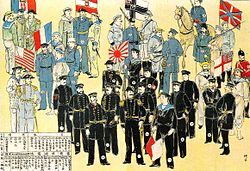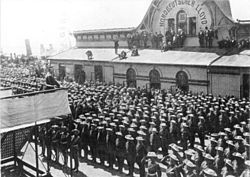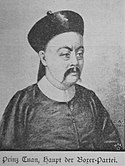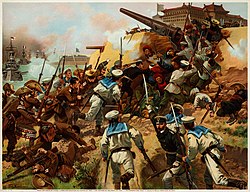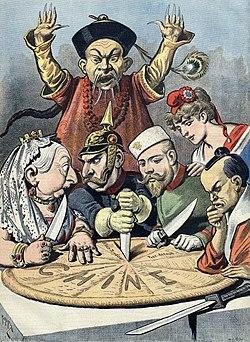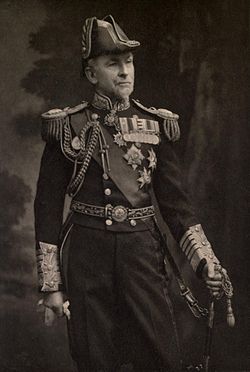Troops of the Eight-Nation Alliance (except Russia) that fought against the Boxer Rebellion in China, 1900. From the left Britain, United States, Australia, India, Germany, France, Austria-Hungary, Italy, Japan. (49652330563)
Attribution:
Das Bild ist mit 'Attribution Required' markiert, aber es wurden keine Informationen über die Attribution bereitgestellt. Vermutlich wurde bei Verwendung des MediaWiki-Templates für die CC-BY Lizenzen der Parameter für die Attribution weggelassen. Autoren und Urheber finden für die korrekte Verwendung der Templates hier ein Beispiel.
Größe:
2012 x 1234 Pixel (2621332 Bytes)
Beschreibung:
Troops of the Eight-Nation Alliance, 1900, by by Captain C.F. O’Keefe; Colorized by Julius Jääskeläinen. Note: The Boxer Rebellion (拳亂), Boxer Uprising, or Yihetuan Movement (義和團運動) was an anti-imperialist, anti-foreign, and anti-Christian uprising in China between 1899 and 1901, toward the end of the Qing dynasty. It was initiated by the Militia United in Righteousness (Yìhéquán), known in English as the Boxers because many of their members had practiced Chinese martial arts, also referred to in the west as Chinese Boxing. Villagers in North China had been building resentment against Christian missionaries who ignored tax obligations and abused their extraterritorial rights to protect their congregants against lawsuits. The immediate background of the uprising included severe drought and disruption by the growth of foreign spheres of influence after the Sino-Japanese War of 1895. After several months of growing violence and murder in Shandong and the North China Plain against foreign and Christian presence in June 1900, Boxer fighters, convinced they were invulnerable to foreign weapons, converged on Beijing with the slogan Support the Qing government and exterminate the foreigners. Foreigners and Chinese Christians sought refuge in the Legation Quarter. In response to reports of an invasion by Eight Nation Alliance of American, Austro-Hungarian, British, French, German, Italian, Japanese, and Russian troops to lift the siege, the initially hesitant Empress Dowager Cixi supported the Boxers and on June 21 issued an Imperial Decree declaring war on the foreign powers. Diplomats, foreign civilians, and soldiers as well as Chinese Christians in the Legation Quarter were besieged for 55 days by the Imperial Army of China and the Boxers. Chinese officialdom was split between those supporting the Boxers and those favoring conciliation, led by Prince Qing. The supreme commander of the Chinese forces, the Manchu General Ronglu (Junglu), later claimed he acted to protect the foreigners. Officials in the Mutual Protection of Southeast China ignored the imperial order to fight against foreigners. The Eight-Nation Alliance, after being initially turned back, brought 20,000 armed troops to China, defeated the Imperial Army, and arrived at Peking on August 14, relieving the siege of the Legations. Uncontrolled plunder of the capital and the surrounding countryside ensued, along with summary execution of those suspected of being Boxers. The Boxer Protocol of 7 September 1901 provided for the execution of government officials who had supported the Boxers, provisions for foreign troops to be stationed in Beijing, and 450 million taels of silver—approximately $10 billion at 2018 silver prices and more than the government's annual tax revenue—to be paid as indemnity over the course of the next 39 years to the eight nations involved.
Weitere Informationen zur Lizenz des Bildes finden Sie hier. Letzte Aktualisierung: Mon, 27 Jan 2025 13:57:14 GMT
Relevante Bilder
Relevante Artikel
Boxeraufstand
Der Boxeraufstand, auch Boxerkrieg genannt, war ein bewaffneter Konflikt zwischen den chinesisch-nationalistischen Yihetuan
(義和團 / 义和团, Yìhétuán – „Verband für Gerechtigkeit und Harmonie“) bzw. Yihequan und westlichen Großmächten. Das gewaltsame Vorgehen der Yihetuan, die aufgrund ihrer traditionellen Kampfkunstausbildung im Westen als „Boxer“ bezeichnet wurden, gegen christliche Missionare und andere Vertreter westlicher Staaten, entwickelte sich zu einem Krieg zwischen dem Kaiserreich China und den europäischen Großmächten, den USA und Japan.
.. weiterlesen

